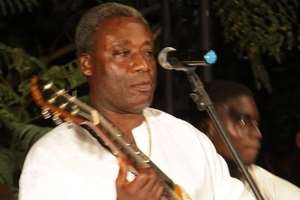
One Hot afternoon in the 1980s, I was making the rounds of popular places in Accra, trying (as was often the case in those days) to find petrol to buy.
Near what was then Chief Mark Cofie's motor workshop at Osu, I heard loud music blaring out from a bar near the road, which had apparently been set up on my blind side.
The music was fantastic, and I quickly found a place to park my car. I then walked to an open space near the Catholic Cathedral, where the bar was operating from. No sooner had I entered the grounds than a strong feeling rose in me to join the dancers on the floor.
Without waiting to find out whether I would be able to quench my thirst with a beer; without scouting for some unaccompanied lass who might be willing to accompany me to the dance floor; without knowing if the amazing song blaring out of the loudspeakers would end soon or not – I just dove into the waves of the intoxicating music.
I don’t think I have ever enjoyed dancing as much as I did that afternoon. I had often, in the distant past (when Ghana was one huge pot of enjoyable entertainment, daring one to “taste and see” what Weekend in Havana; Apollo Theatre; Lido or some such venue would offer) done my bit of hi-living.
But apart from one “24th Night”, when Koforidua Casino Dance Band had invaded Bunso (Eastern Region), near my hometown, I could not recall being seized by music into such frenzy as I was feeling.
The lyrics of the song were simple: Ako te Brofo ooh, Eeei eei! Efiri tete ako te Brofo ooh Eeei eeh!”
(The parrot can speak English well; from long ago, the parrot has been very eloquent in spoken English!”)
Not exactly words that would set the sea blaze, were they? But the nice baritone voice that intoned them matched the music in its beauty. Anyway, whoever penned the lyrics had realised that to just keep repeating that a parrot could speak English (a novel idea though it was) could be taken this far but not beyond!
So, he had penned a second verse in which to make sure that any accusation of being “superficial” would not stick! – He inserted a complete Twi proverb, pondering which would be enough to satisfy the advocates of philosophical profundity in pop songs: Krotwiamansa to nsu mu a, Ne ho na ofor, Na nensanho no de, Ewo ho daa! (When the leopard falls into a pond, Its skin does get wet.
But that’s as far as it goes: Its stripes remain forever!”)
After satisfying my musical/dancing hunger, I took myself home and began to ask about the musician who had impressed me so much.
Very little information was available about him. I was merely told that his name was “George Darko”, and that he was a practitioner of “burger hi-life” music. I was hoping to hear more of his music, but never came across his band or himself.
It shows you how difficult it is to maintain a reputation as an artiste in Ghana. I never heard of any music promoter organising an event featuring George Darko and his band.
Of course, it is possible that such a promotion took place while I was away from Ghana. But I did keep my ears open whilst abroad, yet never heard of George Darko performing.
Agya Koo Nimo mentioned George’s name with affection in one of Agya Koo’s TV interviews, and (I think) also in his autobiography.
The fact that Agya Koo Nimo had mentioned George Darko as one of the guitarists he had interacted with made me want to meet George more than ever. But I never got to satisfy that wish, nor ever will.
For, sadly, George has passed, at the age of 73. He apparently had been hospitalised for some months at the Tetteh Quarshie Memorial hospital at Akwapim Mampong (where George was sub-chief, with the title, Nana Ampem Darko.) Da yie, wae, George! (Says one of your most ardent fans)




 Don't travel to volatile regions in northern Mali — Ministry of Foreign Affair t...
Don't travel to volatile regions in northern Mali — Ministry of Foreign Affair t...
 ILO’s claim of depleting reserves false, we have funds to pay pensions — SSNIT
ILO’s claim of depleting reserves false, we have funds to pay pensions — SSNIT
 Benin police fire tear gas to break up union protest
Benin police fire tear gas to break up union protest
 Lay KPMG audit report on SML-GRA contract before Parliament – Isaac Adongo tells...
Lay KPMG audit report on SML-GRA contract before Parliament – Isaac Adongo tells...
 Supervisor remanded for stabbing businessman with broken bottle and screwdriver
Supervisor remanded for stabbing businessman with broken bottle and screwdriver
 People no longer place value in public basic schools; new uniforms, painting wil...
People no longer place value in public basic schools; new uniforms, painting wil...
 'Comedian' Paul Adom Otchere needs help – Sulemana Braimah
'Comedian' Paul Adom Otchere needs help – Sulemana Braimah
 Ejisu by-election: Only 33% of voters can be swayed by inducement — Global InfoA...
Ejisu by-election: Only 33% of voters can be swayed by inducement — Global InfoA...
 Minority will expose the beneficial owners of SML, recover funds paid to company...
Minority will expose the beneficial owners of SML, recover funds paid to company...
 Prof. Opoku-Agyemang has ‘decapitated’ the NPP’s strategies; don’t take them ser...
Prof. Opoku-Agyemang has ‘decapitated’ the NPP’s strategies; don’t take them ser...
